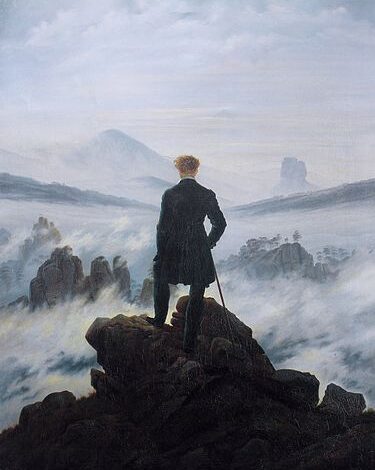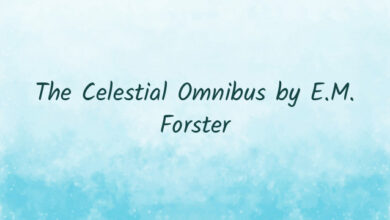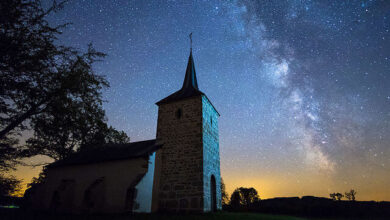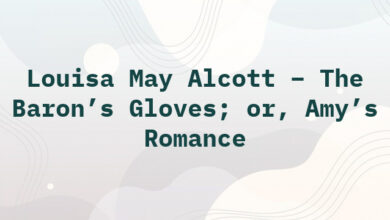
May Day Eve by Algernon Blackwood
IV
It was at this moment the sound of the purring first reached me—deep, guttural purring—that made me think at once of some large concealed animal. It was precisely what I had heard many a time at the Zoological Gardens, and I had visions of cows chewing the cud, or horses munching hay in a stall outside the cottage. It was certainly an animal sound, and one of pleasure and contentment.
Semi-darkness filled the room. Only a very faint moonlight, struggling through the mist, came through the window, and I moved back instinctively toward the support of the wall against my back. Somewhere, through openings, came the sound of the night driving over the roof, and far above I had visions of those everlasting winds streaming by with clouds as large as continents on their wings. Something in me wanted to sing and shout, but something else in me at the same time was in a very vivid state of unreasoning terror. I felt immense, yet tiny, confident, yet timid; a part of huge, universal forces, yet an utterly small, personal, and very limited being.
In the corner of the room on my right stood the woman. Her face was hid by a mass of tumbling hair, that made me think of living grasses on a field in June. Thus her head was partially turned from me, and the moonlight, catching her outline, just revealed it against the wall like an impressionist picture. Strange hidden memories stirred in the depths of me, and for a moment I felt that I knew all about her. I stared about me quickly, nervously, trying to take in everything at once. Then the purring sound grew much louder and closer, and I forgot my notion that this woman was no stranger to me and that I knew her as well as I knew myself. That purring thing was in the room close beside me. Between us two, indeed, it was, for I now saw that her arm nearest to me was raised, and that she was pointing to the wall in front of us.
Following the direction of her hand, I saw that the wall was transparent, and that I could see through a portion of it into a small square space beyond, as though I was looking through gauze instead of bricks. This small inner space was lighted, and on stooping down I saw that it was a sort of cupboard or cell-like cage let into the wall. The thing that purred was there in the centre of it.
I looked closer. It was a being, apparently a human being, crouched down in its narrow cage, feeding. I saw the body stooping over a quantity of coarse-looking, piled-up substance that was evidently food. It was like a man huddled up. There it squatted, happy and contented, with the minimum of air, light, and space, dully satisfied with its prisoned cage behind the bars, utterly unconscious of the vast world about it, grunting with pleasure, purring like a great cat, scornfully ignorant of what might lie beyond. The cell, moreover, I saw was a perfect masterpiece of mechanical contrivance and inventive ingenuity—the very last word in comfort, safety and scientific skill. I was in the act of trying to fit in my memory some of the details of its construction and arrangement, when I made a chance noise, and at once became too agitated to note carefully what I saw. For at the noise the creature turned, and I saw that it was a human being—a man. I was aware of a face close against my own as it pressed forward, but a face with embryonic features impossible to describe and utterly loathsome, with eyes, ears, nose and skin, only just sufficiently alive and developed to transfer the minimum of gross sensation to the brain. The mouth, however, was large and thick-lipped, and the jaws were still moving in the act of slow mastication.
I shrank back, shuddering with mingled pity and disgust, and at the same moment the woman beside me called me softly by my own name. She had moved forward a little so that she stood quite close to me, full in the thin stream of moonlight that fell across the floor, and I was conscious of a swift transition from hell to heaven as my gaze passed from that embryonic visage to a countenance so refined, so majestic, so divinely sensitive in its strength, that it was like turning from the face of a devil to look upon the features of a goddess.
At the same instant I was aware that both beings—the creature and the woman—were moving rapidly toward me.
A pain like a sharp sword dived deep down into me and twisted horribly through my heart, for as I saw them coming I realized in one swift moment of terrible intuition that they had their life in me, that they were born of my own being, and were indeed projections of myself. They were portions of my consciousness projected outwardly into objectivity, and their degree of reality was just as great as that of any other part of me.
With a dreadful swiftness they rushed toward me, and in a single second had merged themselves into my own being; and I understood in some marvellous manner beyond the possibility of doubt that they were symbolic of my own soul: the dull animal part of me that had hitherto acknowledged nothing beyond its cage of minute sensations, and the higher part, almost out of reach, and in touch with the stars, that for the first time had feebly awakened into life during my journey over the hill.
V
I forget altogether how it was that I escaped, whether by the window or the door. I only know I found myself a moment later making great speed over the moor, followed by screaming birds and shouting winds, straight on the track downhill toward the Manor House. Something must have guided me, for I went with the instinct of an animal, having no uncertainties as to turnings, and saw the welcome lights of windows before I had covered another mile. And all the way I felt as though a great sluice gate had been opened to let a flood of new perceptions rush like a sea over my inner being, so that I was half ashamed and half delighted, partly angry, yet partly happy.
Servants met me at the door, several of them, and I was aware at once of an atmosphere of commotion in the house. I arrived breathless and hatless, wet to the skin, my hands scratched and my boots caked with mud.
“We made sure you were lost, sir,” I heard the old butler say, and I heard my own reply, faintly, like the voice of someone else:
“I thought so too.”
A minute later I found myself in the study, with the old folk-lorist standing opposite. In his hands he held the book I had brought down for him in my bag, ready addressed. There was a curious smile on his face.
“It never occurred to me that you would dare to walk—to-night of all nights,” he was saying.
I stared without a word. I was bursting with the desire to tell him something of what had happened and try to be patient with his explanations, but when I sought for words and sentences my story seemed suddenly flat and pointless, and the details of my adventure began to evaporate and melt away, and seemed hard to remember.
“I had an exciting walk,” I stammered, still a little breathless from running. “The weather was all right when I started from the station.”
“The weather is all right still,” he said, “though you may have found some evening mist on the top of the hills. But it’s not that I meant.”
“What then?”
“I meant,” he said, still laughing quizzically, “that you were a very brave man to walk to-night over the enchanted hills, because this is May Day eve, and on May Day eve, you know, They have power over the minds of men, and can put glamour upon the imagination——”
“Who—’they?’ What do you mean?”
He put my book down on the table beside him and looked quietly for a moment into my eyes, and as he did so the memory of my adventure began to revive in detail, and I thought quickly of the shadowy man who had shown me the way first. What could it have been in the face of the old folk-lorist that made me think of this man? A dozen things ran like flashes through my excited mind, and while I attempted to seize them I heard the old man’s voice continue. He seemed to be talking to himself as much as to me.
“The elemental beings you have always scoffed at, of course; they who operate ceaselessly behind the screen of appearances, and who fashion and mould the moods of the mind. And an extremist like you—for extremes are always dangerously weak—is their legitimate prey.”
“Pshaw!” I interrupted him, knowing that my manner betrayed me hopelessly, and that he had guessed much. “Any man may have subjective experiences, I suppose——”
Then I broke off suddenly. The change in his face made me start; it had taken on for the moment so exactly the look of the man on the hillside. The eyes gazing so steadily into mine had shadows in them, I thought.
“Glamour!” he was saying, “all glamour! One of them must have come very close to you, or perhaps touched you.” Then he asked sharply, “Did you meet anyone? Did you speak with anyone?”
“I came by Tom Bassett’s cottage,” I said. “I didn’t feel quite sure of my way and I went in and asked.”
“All glamour,” he repeated to himself, and then aloud to me, “and as for Bassett’s cottage, it was burnt down three years ago, and nothing stands there now but broken, roofless walls——”
He stopped because I had seized him by the arm. In the shadows of the lamp-lit room behind him I thought I caught sight of dim forms moving past the book-shelves. But when my eye tried to focus them they faded and slipped away again into ceiling and walls. The details of the hill-top cottage, however, started into life again at the sight, and I seized my friend’s arm to tell him. But instantly, when I tried, it all faded away again as though it had been a dream, and I could recall nothing intelligible to repeat to him.
He looked at me and laughed.
“They always obliterate the memory afterward,” he said gently, “so that little remains beyond a mood, or an emotion, to show how profoundly deep their touch has been. Though sometimes part of the change remains and becomes permanent—as I hope in your case it may.”
Then, before I had time to answer, to swear, or to remonstrate, he stepped briskly past me and closed the door into the hall, and then drew me aside farther into the room. The change that I could not understand was still working in his face and eyes.
“If you have courage enough left to come with me,” he said, speaking very seriously, “we will go out again and see more. Up till midnight, you know, there is still the opportunity, and with me perhaps you won’t feel so—so——”
It was impossible somehow to refuse; everything combined to make me go. We had a little food and then went out into the hall, and he clapped a wide-awake on his gray hairs. I took a cloak and seized a walking-stick from the stand. I really hardly knew what I was doing. The new world I had awakened to seemed still a-quiver about me.
As we passed out on to the gravel drive the light from the hall windows fell upon his face, and I saw that the change I had been so long observing was nearing its completeness, for there breathed about him that keen, wonderful atmosphere of eternal youth I had felt upon the inmates of the cottage. He seemed to have gone back forty years; a veil was gathering over his eyes; and I could have sworn that somehow his stature had increased, and that he moved beside me with a vigour and power I had never seen in him before.
And as we began to climb the hill together in silence I saw that the stars were clear overhead and there was no mist, that the trees stood motionless without wind, and that beyond us on the summit of the hills there were lights dancing to and fro, appearing and disappearing like the inflection of stars in water.




